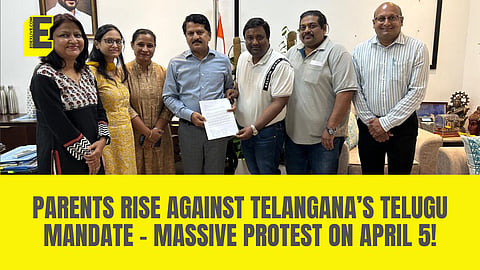Parents rise against Telangana’s Telugu mandate – Massive protest on April 5!
Hyderabad is set to witness a massive protest tomorrow, Friday, April 5, as parents, students, and teachers plan to gather at Indira Park to oppose the Telangana government’s decision to mandate Telugu as a second language for all the Central Board of Secondary Education (CBSE), Indian Certificate of Secondary Education (ICSE), and International Baccalaureate (IB) schools from the 2025–26 academic year.
The move has sparked widespread discontent among parents, particularly those from non-Telugu-speaking backgrounds, who argue that it strips students of their freedom to choose a second language.
Several top schools in Hyderabad have already implemented the mandate, scrapping existing second-language options such as Hindi and Urdu. This has prompted parents to launch the Freedom To Choose Language campaign, urging the government to reconsider its decision.
Many parents argue that Telugu should instead be introduced as a third language in a phased manner, allowing students to retain the option to study Hindi, Sanskrit, or foreign languages as their second language.
‘Almost impossible to pass’: Parents raise concerns over Board exams
Rahul Kejriwal, one of the core committee members of the campaign and a parent of a Class VII student, highlighted how this sudden mandate is particularly harsh on students who have never studied Telugu before.
“This issue started in 2017 under the previous government but was never fully implemented due to COVID. Now, the current government has made it mandatory without options. Students who have studied Hindi or Sanskrit for years will suddenly have to appear for the Class X Board exams in Telugu, which is almost impossible for them to pass,” he informed.
Kejriwal acknowledged the importance of learning the regional language but emphasised the need for flexibility.
“We agree that students should learn Telugu because they are living in Telangana, but it should be made a third language, not the second. The second language should remain optional as per CBSE norms, allowing students to choose from Hindi, Sanskrit, Urdu, or French.”
Protests escalate as parents warn of legal action
Another parent, Kavya Bollaki, echoed similar concerns, emphasising how the decision was made unilaterally without consulting parents or conducting a public poll.
“The Telangana government issued this directive just before schools reopened, leaving no time for students and schools to adjust. Even Telugu-speaking families do not prefer Telugu as a second language because it is not considered a scoring subject. Why enforce it so abruptly?” she questioned.
“If the government insists on making Telugu compulsory, then remove French, Spanish, and other foreign language options but let Telugu be a third language,” she asserted.
With parents unwilling to back down, tomorrow’s protest is just the beginning.
Kejriwal revealed that the group has already approached the Director of School Education, EV Narsimha Reddy, to discuss their concerns.
“We had a one-and-a-half-hour-long discussion with him, and he acknowledged the issue. He assured us that he would look into it. If no action is taken, we will be left with no choice but to take legal action,” he said.
Parallels from Karnataka & Tamil Nadu’s three language policy
The uproar in Telangana over compulsory Telugu mirrors ongoing debates in Karnataka and Tamil Nadu regarding the Three-Language Policy under the National Education Policy (NEP) 2020. Tamil Nadu has been a strong opponent of the policy, while Karnataka has recently seen rising protests against it.
A similar concern now arises in Telangana, where students accustomed to Hindi or Sanskrit as a second language are suddenly expected to master Telugu within a short span. This situation highlights that making language something inherently free and expressive compulsory can lead to long-term challenges. Language serves as a means of self-expression and cultural connection, and while National Education Policy (NEP) 2020 promotes vernacular languages, enforcing a mandate negates the rationale and vision of such policies.
As the protest gains momentum, parents are making their stand clear. They are more than willing to embrace Telugu as a third language but strongly oppose making it the only second-language option as forcing Telugu, especially for students in higher classes, will create unnecessary academic stress; therefore, they have respectfully urged the government to reconsider and offer language flexibility.


